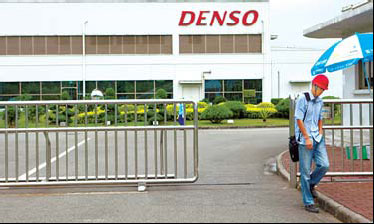Cars
Denso to boost China output on rising demand
By Makiko Kitamura (China Daily)
Updated: 2010-07-10 09:41
 |
Large Medium Small |
|
 |
|
A man walks out of the Denso (Guangzhou Nansha) Co Ltd plant in Guangzhou. Denso Corp is a supplier of automobile parts to world-leading companies including Toyota Motor Corp and Honda Motor Co. [Agencies] |
TOKYO - Denso Corp, Toyota Motor Corp's largest component supplier, plans to expand production capacity in China during the next 12 months as rising demand outweighs concerns that labor costs in the nation will increase.
Denso, the world's biggest listed auto parts maker, will add "several hundred thousand units" of capacity in China, mostly to make air conditioners for cars, said Chief Executive Officer Nobuaki Katoh.
One of Denso's joint-venture plants in China halted production for four-and-a-half days in June as workers walked out demanding higher wages.
"Demand in China is very strong," Katoh said in an interview on Wednesday in Kariya, Japan, where the company is based. "We need to add to our readiness step by step."
Passenger-car sales in China, the world's largest auto market, rose 10.9 percent from a year earlier to 839,228 units in June as the economy expanded 11.9 percent in the first quarter. Toyota plans to start building 100,000 Corolla cars a year at its factory in Changchun, Jilin province, in the first half of 2012.
Honda Motor Co, Japan's second-largest carmaker, aims to expand capacity in China by 28 percent by the second half of 2012.
At least eight strikes since May have forced suppliers to Toyota, Honda and Nissan Motor Co to raise wages in China, increasing carmakers' costs. Honda agreed to offer a 24 percent pay increase to 1,910 yuan ($282) a month to workers at Honda Auto Parts Manufacturing Co in Foshan, Guangdong.
Profit forecast
Denso rose 1.8 percent to close at 2,602 yen on Friday in Tokyo trading, trimming its loss this year to 6.4 percent. Toyota declined 0.3 percent.
Denso hasn't disclosed how much it raised wages to end the walkout at Denso Guangzhou Nansha Co, a joint venture in Guangzhou.
Wages will probably continue to rise in China, and "there isn't much impact on our profitability", Katoh said. "Having more frequent conversations with employees and deepening communication is the most fundamental way" to avert further strikes, Katoh said.
Profit this year may exceed Denso's forecast on strong sales in Japan and the US, Katoh said. Expiring subsidies for cars in Japan in September and possible declining consumer confidence in Europe have made the outlook for the second half of this year less certain, he said.
Production costs
| ||||
Denso is aiming to halve its production costs for parts to be used in carmakers' low-cost models for emerging markets, Katoh said. The company will increase procurement of materials and components in the countries it sells in, he said.
Toyota will start selling the low-cost Etios compact in India later this year, and Nissan plans to sell a $3,000 car built by Bajaj Auto Ltd. Denso already supplies wipers to Tata Motors Ltd's Nano, the world's cheapest car.
Denso's main rival is Germany's Robert Bosch GmbH. While growth is important, the company doesn't focus on expanding market share for the sake of being number one, Katoh said. "You lose modesty that way," he said. "It doesn't put the customer first."
Bloomberg News



